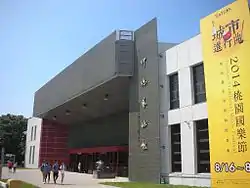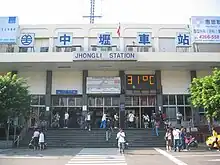Zhongli District
Zhongli District (Chinese: 中壢區; pinyin: Zhōnglì Qū) is a district in Taoyuan City, Taiwan. Zhongli is spelled variously as Jungli, Jongli, Jhongli or Chungli on railway stations, bus stops and road signs. Historically, the city is the site of the Zhongli Incident of 1977, the most significant event of the democratization movement prior to the 1980s. Ethnically, it is considered a capital city for Hakka Taiwanese, who live in great numbers here and in surrounding areas; many elderly persons can speak Hakka in addition to Mandarin and Taiwanese Hokkien.[1] In recent years many foreign workers (mainly from the Philippines and Thailand) have also settled in and around the city due to the heavy industry in the suburbs of the city, making it a center for foreign laborers.[2] The district of Zhongli has three large parks and over 70 green reserves.
Zhongli
中壢區 Chūreki, Jhongli, Chungli, Tiong-lek | |
|---|---|
| Zhongli District | |
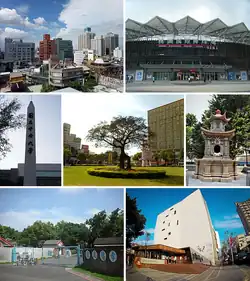 Clockwise from top left: Zhongli skyline, Taoyuan International Baseball Stadium, Zhongli Word-worshipping Paper Incinerator, Taoyuan Public Library Longgang Branch, Matsu New Village, National Central University. Center: Zhongli Zhongzheng Park | |
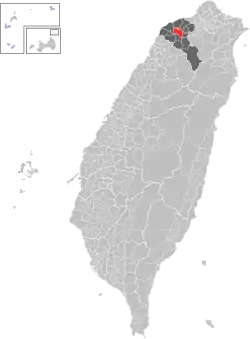 | |
| Coordinates: 24°57′25″N 121°13′25″E | |
| Country | |
| Municipality | Taoyuan City |
| Area | |
| • Total | 76.52 km2 (29.54 sq mi) |
| Population (March 2023) | |
| • Total | 426,326 |
| • Density | 5,600/km2 (14,000/sq mi) |
| Postal code | 320 |
| Area code | (0)34 |
| Website | www |
Zhongli District is the busiest district in Southern Taoyuan (南桃園), as well as the location of the Taoyuan HSR station.
History
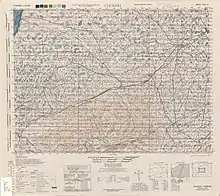
| Zhongli District | |||||||||||||||||||||||||||
|---|---|---|---|---|---|---|---|---|---|---|---|---|---|---|---|---|---|---|---|---|---|---|---|---|---|---|---|
| Traditional Chinese | 中壢區 | ||||||||||||||||||||||||||
| |||||||||||||||||||||||||||
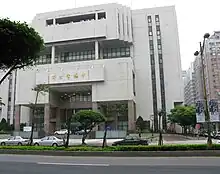
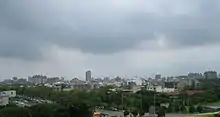
Qing dynasty
In the 19th century, the area was home to Plains aborigines. During the Qing dynasty, immigrants from Fujian and Guangdong provinces arrived along with Hakka.[3] The original name of the area was Kan-a-lek (Chinese: 澗仔壢; Pe̍h-ōe-jī: Kán-á-le̍k) due to its location between Tamsui and Hsinchu.
During Japanese rule, the town was administered as Chūreki Town (中壢庄), Chūreki District, Shinchiku Prefecture.
Republic of China
After the handover of Taiwan from Japan to the Republic of China in 1945, Zhongli was reorganized as Zhongli Town. In October 1950, it was placed under Taoyuan County. On 1 July 1967, Zhongli was promoted to a county-administered city and became Zhongli City. On 25 December 2014, as Taoyuan County was upgraded to a special municipality named Taoyuan City, Zhongli became a district of the municipality.[4]
Demographics
Zhongli's population was estimated at 426,326 in March 2023, including 10,084 Taiwanese aborigines.[5] Zhongli is subdivided into 85 villages, with the eight biggest but least populated villages on the western side of the district (39 square kilometers but with 35,000 people), while the eastern side is occupied by industrial factories and the heart of the metropolitan area. This reflects the imbalance of development of western and eastern Zhongli.
Administrative divisions
The district comprises 88 villages:[5] Chenggong (成功), Deyi (德義), Duxing (篤行), Fude (福德), Fuhua (復華), Fuxing (復興), Guangming (光明), Guoling (過嶺), Heping (和平), Houliao (後寮), Huaai (華愛), Huaxun (華勛), Jianxing (健行), Jinhua (金華), Jiuming (舊明), Linsen (林森), Longan (龍安), Longchang (龍昌), Longci (龍慈), Longde (龍德), Longgang (龍岡), Longping (龍平), Longdong (龍東), Longxing (龍興), Mingde (明德), Neicuo (內厝), Neiding (內定), Neili (內壢), Puqiang (普強), Puqing (普慶), Puren (普仁), Puyi (普義), Puzhong (普忠), Qiaxi (洽溪), Qingpu (青埔), Qingxi (青溪), Renai (仁愛), Rende (仁德), Renfu (仁福), Renhe (仁和), Renmei (仁美), Renxiang (仁祥), Renyi (仁義), Sanmin (三民), Shandong (山東), Shitou (石頭), Shuiwei (水尾), Dongxing (東興), Wenhua (文化), Wufu (五福), Wuquan (五權), Xingfu (幸福), Xingfu (興福), Xingguo (興國), Xinghe (興和), Xinghua (興華), Xingnan (興南), Xingping (興平), Xingren (興仁), Xinjie (新街), Xinming (新明), Xinxing (新興), Xinyi (信義), Yongfu (永福), Yongguang (永光), Yongxing (永興), Yuemei (月眉), Zhengyi (正義), Zhenxing (振興), Zhiba (芝芭), Zhishan (至善), Zhongfu (中福), Zhongjian (中堅), Zhongjian (中建), Zhongli (中壢), Zhongrong (中榮), Zhongshan (中山), Zhongxiao (忠孝), Zhongxing (中興), Zhongyang (中央), Zhongyi (忠義), Zhongyuan (中原), Zhongzheng (中正), Zhuangjing (莊敬), Ziqiang (自強), Zili (自立), Zixin (自信) and Zizhi (自治).
Economy
Department Store and Shops
Zhongli TRA Station is surrounded by shops on the street, and Zhongli also has a SOGO-branched department store. Zhongli Night Market opens daily, usually from 6 p.m. to 1 a.m. In addition, there are two shopping districts: Ta-tung (大同商圈) and Jung-ping (中平商圈), both within half an hour's walk from the Zhongli train station.[6]
Industry
The Zhongli–Neili Industrial Park was established in December 1976. This is a combined multipurpose industrial park, controlled by Taiwan's Economic Bureau, with a total area of 433 sq. yards. There are currently 480 companies that have built either factories or offices here, belonging to electronic, metal, chemical, mechanical, food, textile and plastic manufacturers.
Education
Library
- Zhongli District Library, four floors of books, allowed to be borrowed for a month
- Neili Library
- Longgang Library
Universities
Academies and institutes
- Yuan Kwang Buddhist Academy[8]
- Army Academy R.O.C.
Public high schools
- The Affiliated Jhongli Senior High School of National Central University
- National Neili Senior High School
- National Zhongli Commercial High School[9]
Religious organizations
Taoist and folk religion Temples
- Ren Hai Temple
- San Jiao Zi Yun Temple
- Ci Hui Temple
Buddhist Temples
- Yuan Hua Yuan
- Yong Ping Temple
- Yuan Kuang Ch'an Monastery
Christian Churches
- Taiwan Lutheran Zhongli Truth Church
- Taiwan Presbyterian Church Chungli Church
- Zhongli Church of Christ
- Zhongli Christian Bible Church[10]
- Zhongli Catholic Sacred Heart Church
Mosque
Tourist attractions
- Action Museum
- HeySong Beverage Museum
- Matsu New Village
- Laojie River
- Shengchi Pavilion
- Taiwan High Speed Rail Museum
- Taoyuan Museum of Fine Arts
- Taoyuan Public Library Longgang Branch
- Rakuten Taoyuan Baseball Stadium
- Zhongli Arts Hall
- Zhongli Night Market
- Zhongping Commercial District
- Zhongping Road Story House
- X PARK
Transportation
Railway
Zhongli is centered around the Zhongli railway station, the third-busiest railway station in Taiwan. In addition, there is also the Neili railway station and the under-construction Chungyuan railway station. The Taoyuan HSR station on the Taiwan High Speed Rail (THSR) is a 15-minute drive from central Zhongli. There are free shuttle buses from central Zhongli to the THSR station every 15–20 minutes. The Taoyuan Airport MRT has been open to the public since 2017. An extension of this MRT line from Huanbei Station (A21) to the TRA station is still under construction as of October 2022. Laojie River Station (A22) is expected to open in July 2023, while Zhongli Railway Station (A23) is expected to open in 2028. In addition, the Taiwan Railways Administration Zhongli Station provides conventional train connections to other Taiwanese cities.
Mass rapid transit
- A18 Taoyuan HSR station
- A19 Taoyuan Sports Park metro station
- A20 Xingnan metro station
- A21 Huanbei metro station
- A22 Laojie River metro station (2023)
- A23 Zhongli railway station (2028)
Taiwan Railways
- Neili railway station
- Chungyuan railway station (2030)
- Zhongli railway station
Taiwan High Speed Rail
Roads
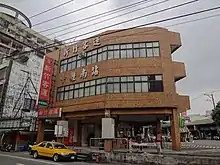
Zhongli is served by both National Highway No. 1 and Provincial Highway No. 66. The nationally owned E-Go freeway buses, near the Zhongli Station, are an inexpensive way of transport to other cities.
Sister Cities
 Gumi, Republic of Korea (since 1989)
Gumi, Republic of Korea (since 1989) Enfield, Connecticut, United States
Enfield, Connecticut, United States
Notable natives
- Angela Chang, singer and actress
- Candy Chen, dancer, actress, host, singer and model
- Maggie Chiang, singer and songwriter
- Hu Chen-pu, Commandant of the ROC Army (2006–2007)
- Elva Hsiao, singer and actress
- Hsu Hsin-liang, Chairperson of Democratic Progressive Party (1996–1998)
- Huang Pei-jia, actress
- Wu Po-hsiung, Chairman of Kuomintang (2007–2009)
- Shih Szu, actress
- John Wu, Magistrate of Taoyuan County (2009–2014)
- Aska Yang, singer
See also
References
- 總計畫:客家紮根研究 (PDF) (in Chinese). Archived from the original (PDF) on March 25, 2014. Retrieved January 8, 2014.
- 經濟部工業局中壢工業區服務中心--首頁.
- "History". Zhongli City. 2010-06-21. Retrieved 2010-07-03.
- http://163.29.191.47/en2013/intro/dept2/List.asp
- "認識我們" 認識我們 [About Us]. tycg.gov.tw (in Chinese). Household Registration Office of Zhongli District, Taoyuan. 22 July 2020. Retrieved 2022-06-21.
- Kelley, Brandi (2018). "Where have you been all my life?". Dance Major Journal. 6. doi:10.5070/d561040996. ISSN 2578-9627.
- "Education and Culture". Zhongli City. 2010-06-21. Retrieved 2010-07-03.
- Yuan Kwang Buddhist Academy, Taiwan.
- National Zhongli Commercial High School, Zhongli, Taiwan.
- Zhongli Christian Bible Church, Taiwan http://www.aizhu.com/zcbc
External links
- Official website
 (in Chinese)
(in Chinese) - Taoyuan County Government's Cultural Affairs Bureau (in English)
- Zhongli Industrial Park Service Center (in Chinese)
